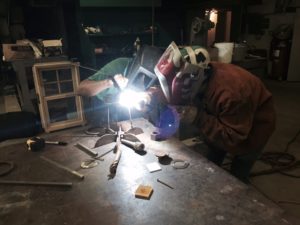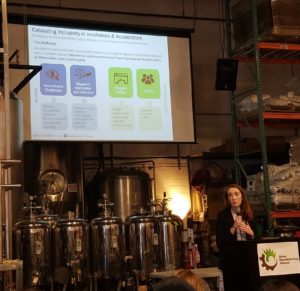Back

Blog
New Advocates on the Scene to Support the Maker Movement

A common misperception about the Maker Movement is that it is limited to crafters and hobbyists with only a narrow impact on local and regional economies. While some makers are indeed hobbyists, the movement also includes many active and nascent entrepreneurs who are interested in commercializing their products. These products can range widely, from jewelry and leather goods, to craft beer and artisanal bread, to drones and mini robots.
Recently, a number of organizations have emerged on the national scene, bringing a spotlight to the Maker Movement and advocating for its potential to spur inclusive economic development. Organizations like Maker City, a social impact and advisory organization headquartered in San Francisco, are hard at work to remedy the incomplete understanding of the Maker Movement. For advocates like Maker City, it is clear that the opportunity to leverage the growing movement to accelerate economic activity and opportunity will rely on strengthening local collaborative makerspaces and ecosystems.
Colleges and universities have seen the importance of supporting makerspaces, and there are a growing number of makerspace partnerships geared toward youth and students. This year, twenty-four colleges in California received Maker Implementations Grants from the California Community Colleges Chancellors Office to build inclusive makerspaces on their campuses. The objective of these grants is to prepare students for STEM careers, fuel job creation, and strengthen regional economies. Penn State’s recently launched Working Class Makerspace is a partnership with a similar goal in Pennsylvania. Since 2015, the university has funded seventeen startup accelerators, coworking spaces, and makerspaces in various communities, as part of a state-wide economic development initiative.
Makerspace partnerships such as these, and the work done by Maker City, demonstrate why it is important for the Maker Movement to receive early and strong municipal support, particularly in inner cities. Cities that support their local maker ecosystem will be best positioned to reap the economic benefits created by makers that go on to launch products and grow businesses.
Maker City recently authored a book in conjunction with the Obama White House and its Office of Science and Technology Policy. The book explores the ethos of the Maker Movement and provides a guide for cities that want to support the movement. It covers topics such as creating an open maker ecosystem, promoting education and workforce development, strengthening industrial supply chains, and addressing real estate and land use issues that prevent growth.
As part of its advocacy, Maker City is exploring a number of new projects including a workforce development toolkit and a “Maker City Heroes” program that honors those who are spearheading the Maker Movement and leading change in their own communities.
Maker City has also partnered with U.S. News and World Report to create the Maker City rankings, which it calls “a new and more forward looking way of thinking about what defines an industrial city or town.” The first iteration of the rankings was released earlier this year, with Chattanooga, Kansas City, Louisville, Pittsburgh, and San Diego among the cities earning a spot on the list.
“Much as we’ve seen with our coverage of STEM over the last seven years, ‘Maker’ is short-hand for something very large,” says U.S. News Editor Brian Kelly. “It unpacks some of the key components necessary to solve the challenge of aligning education, skills and jobs in manufacturing. In other words, one of the central economic issues facing the United States—and indeed, the rest of the world.”
Maker City is one of several organizations supporting the Maker Movement. This blog previously featured the important work that the Urban Manufacturing Alliance (UMA) has done in supporting small batch urban manufacturing.
Central to UMA’s mission is bringing a targeted focus on equity and inclusion within the manufacturing sector. UMA is cognizant of the importance of building and strengthening collaborative networks, building “communities of practice” centered on the ongoing challenges facing manufacturing and the Maker Movement. In addition to a focus on sharing best practices, UMA is also an advocate at the federal, state, and municipal levels, promoting policy and practice that can enhance the urban Maker Movement. As part of its efforts, UMA partnered with the Pratt Center and PolicyLink to launch the Equitable Innovation Economies Initiative (EIE) in 2014. EIE aims to help cities create inclusive growth strategies in innovation and manufacturing. The initiative recognizes that manufacturers – from makers to the more established businesses – can play an important role in reducing inequality through employment creation and shared prosperity, and they provide tools, perspectives, and insights for the field.
ICIC was invited to speak at UMA’s Spring Gathering, which took place in Somerville, MA this past May. Building on the conference’s theme, “Making, Scaling and Inclusion,” ICIC’s Kathleen O’Shea presented our research related to strategies for increasing diversity and inclusion in entrepreneurial support organizations, including incubators, accelerators, and makerspaces.

Makers have the potential to substantially impact the economic vitality of cities. By encouraging makerspaces and entrepreneurship-focused organizations, cities can grow and strengthen their workforce and lay the groundwork for a thriving small business community. As makerspaces continue to grow in importance and scale, the dual goal of growing economic opportunity and focusing on sustained diversity and inclusion will become an increasing imperative.
